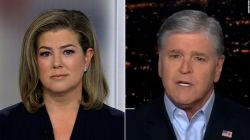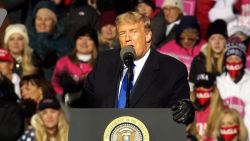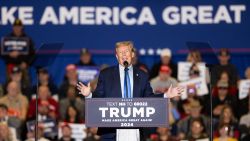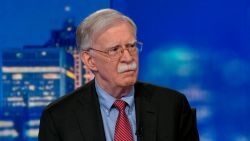Editor’s Note: Van Jones is CEO of REFORM Alliance and co-founder of #cut50, a bipartisan criminal justice initiative of the Dream Corps. He is also the author of “Beyond the Messy Truth: How We Came Apart, How We Come Together.” In 2009, Jones worked as the Green Jobs Adviser in the Obama White House. The views expressed in this commentary are his own. Read more opinion on CNN.

In this era of extreme political division, one issue is bringing people together: the need to invest in public safety solutions that reduce crime and make the criminal justice system fairer.
For the first time in my life, it appears every presidential candidate is running as a champion of criminal justice reform – including (to the shock of many) Donald J. Trump. It is an astonishing reversal in both political parties. For decades, ambitious politicians tried to outdo each other with “lock ‘em up” policies and “tough-on-crime” rhetoric.

This dynamic accelerated after George H.W. Bush crushed Massachusetts Democrat Michael Dukakis in the 1988 presidential race. Popular wisdom attributed the win to television ads spotlighting a prisoner named Willie Horton, who committed heinous crimes while part of Dukakis’ prison furlough program. Afterward, generations of politicians were afraid to champion prison reform.
So, how did justice reform emerge as the one cause that brings people together? The answers are complicated – and surprising.
I have a special perspective on the topic. In California, the Ella Baker Center for Human Rights, which I co-founded in 1996, helped to close five abusive youth prisons; we also blocked construction of a draconian “super jail for youth” near Oakland. Five years ago, I co-founded the Dream Corps’ #cut50 campaign with Jessica Jackson and Matt Haney, through which we passed more than a dozen bipartisan criminal justice bills at the state level, plus last year’s federal First Step Act. This year, I helped launch the REFORM Alliance, which aims to shrink and transform the probation and parole systems.
I have dedicated my life to this cause. But I have never seen anything like 2019 – a year in which all presidential candidates and both parties are fighting over who can be trusted to put fewer people behind bars while reducing crime.
The magic moment
Any shift of this magnitude has many causes. Let’s explore the top five:
1. The trifecta
We are benefiting from an extraordinary trifecta: low crime rates, a strong economy and both parties being fed up with our bloated, ineffective prison system.
Politicians can more easily embrace reform when job numbers are up. President Barack Obama helped put the US economy into recovery and, under Trump, unemployment has continued to decline. Now, there are more open jobs in some cities than there are qualified workers. And yet, too many job categories still exclude people with criminal records. But, in this economy, more employers are willing to hire formerly incarcerated people, and more lawmakers are willing to invest in job training, “second chance” and “clean slate” bills to help the formerly incarcerated start new lives.
Finally, lawmakers eventually got frustrated investing billions into a system that was failing to rehabilitate a majority of people who came into contact with it. Incarceration fatigue opened the door to new ways of thinking about crime prevention that address underlying causes – like mental health, drugs, trauma, etc. And so leaders began shifting resources to create specialty courts – veterans courts, drug courts, mental health courts – across the country.
2. Culture shift
The television series, “Orange is the New Black,” brought binge-watching Americans inside the lives of women living behind bars. Ava DuVernay’s explosive documentary, “The 13th,” and Netflix series, “When They See Us,” broke hearts. Other documentaries and podcasts, from “Time: The Kalief Browder Story” to “Serial,” opened the public’s eyes.
Authors like Michelle Alexander and Bryan Stevenson shook the consciences of those who read their works. Shaka Senghor’s bestselling book, “Writing My Wrongs,” won the admiration of Oprah Winfrey and helped to open the floodgates for formerly incarcerated authors. And in recent years, household names like Common, John Legend, Alicia Keys and Kim Kardashian have become outspoken advocates.
This wave of popular media pushed into mainstream living rooms and reached beyond the pool of those who once paid attention to the incarceration system. It is now common knowledge that the United States, shamefully, has the highest incarceration rate in the world.
3. Democratic value: Justice
Many people assume that Democrats always opposed mass incarceration. That is a myth. Democrats overwhelmingly backed President Bill Clinton’s disastrous 1994 crime bill. The deep blue state of California just recently began to dig itself out of an incarceration crisis that resulted in the construction of more than 20 prisons but only one university in the past generation. And the national Democratic Party’s platform carefully excluded any reference to criminal justice reform until 2016.
So, what changed? Many things – from #BlackLivesMatter to the opioid crisis.
Seeing African American communities devastated by decades of overpolicing and excessive incarceration, a new generation of black activists rebelled. Starting in 2013, they demanded that Democrats address head-on the issues of racist police abuse and racial bias in the justice system. Their passion gave more political room for traditional civil rights and civil liberties organizations to accelerate their own longstanding reform efforts.
Their grass-roots protests also gave Obama a greater impetus and opportunity to champion criminal justice reform. He took full advantage – granting clemency to close to 2,000 inmates, pushing hard for bipartisan legislation and even becoming the first-ever sitting US president to visit a prison. His attorneys general, Eric Holder and Loretta Lynch, reshaped the Department of Justice – with a focus on incarcerating fewer people. And, in 2016, Hillary Clinton’s platform included a plank calling for criminal justice reform – an issue no nominee had touched for decades.
Pushed past the breaking point, the incarceration generation rose up and insisted that Democrats speak out boldly against the racial injustice in the system. Today, all Democrats echo their call. The protests that started in 2013 have yielded a Democratic Party today that is more firmly grounded in its core ideals of racial, gender and social justice.
But Democrats also know the Republicans aren’t going to “Willie Horton” them, since so many conservatives are also embracing the cause.
4. Republican value: Liberty
Many on the left doubt the sincerity of criminal justice reformers on the right. They can’t believe that Republicans would truly care about a “racial justice” issue. But the truth is that Republicans have their own reasons to oppose the incarceration industry.
Republicans care a lot about public safety. But the “tough on crime” system made many communities less safe. Today, many conservatives want an evidence-based system that focuses on reducing crime. They’ve returned to principles that resonate deeply on the right as they joined the fight for reform.
One such principle is the need for fiscal prudence with taxpayer dollars and less government waste. Fiscal conservatives balk at the $80 billion annual price tag of mass incarceration. That’s one reason Republican governors, like Rick Perry in Texas and Nathan Deal in Georgia, passed reform bills that saved millions of dollars and (in Texas) even closed several prisons, all while bringing the crime rate down.
Another conservative principle is the desire for transparency, accountability and limits on government overreach. Libertarians especially don’t want the government to have too much power over individual lives. The Koch brothers fall into this category. So do US Sens. Mike Lee and Rand Paul and advocacy groups like FreedomWorks.
Yet another conservative value is the faith-based belief in human dignity. Religious conservatives, including Newt Gingrich, worry the present system leaves no real opportunity for second chances or personal redemption. When he was the Republican governor of Mississippi, Phil Bryant explicitly cited his Christian faith as the source of his passion for prison reform.
Black pro-Trump conservatives like Candace Owens and Katrina Pierson are working to return a pro-Lincoln, pro-freedom ethic inside the GOP on this issue.
In theory, of course, all conservatives should oppose a big, failed government bureaucracy that produces bad outcomes while eating up taxpayer dollars. America’s massive prison industry today represents a classic case of this phenomenon. And more and more Republicans – from Right on Crime to Faith & Freedom Coalition to The American Conservative Union Foundation – are willing to say so.
5. The Trump factor
Then there is the most surprising plot twist of all: Trump’s decision to release Alice Johnson. The world watched as Johnson, a 63-year-old grandmother who had been sentenced to die in prison, ran across the road into her family’s arms. We began to hear the President shift from describing himself as “tough on crime” to expressing that he’s tough but fair and recognizing the disproportionate sentencing in the justice system. Surrounded by law enforcement, faith leaders, Republican members and even several Democrats, Trump then endorsed adding sentencing reform to the First Step Act, which he signed into law later that year.
Because many red state governors took the lead, this Republican President could engage on criminal justice reform without risking his base. More importantly, key people in Trump’s inner circle – including his son-in-law, Jared Kushner – were strong allies. This opened the door for formerly incarcerated people (on the left and right) to make repeated visits to the White House, sharing their experiences with senior officials of how the existing system failed them.
People on both sides of the aisle should be glad that Trump decided to adopt the cause – and not crush it. Criminal justice reform could have fallen into a divisive stalemate like guns, climate or immigration. Instead, Trump’s decision to embrace criminal justice reform has set Republicans free to work with Democrats. That’s a good thing for both parties – and a very good thing for the people suffering behind bars.
Lessons beyond criminal justice
I’ve spent time in red states, blue states, Appalachia and urban neighborhoods. I see the same problems everywhere: generational poverty, addiction, underperforming schools, lack of access to mental health services and a broken criminal justice system. Neither party has been able to make a real dent in these problems facing low-income communities.
The sad truth is that Republicans get a lot of votes from poor, rural communities – but have failed to sufficiently improve conditions or expand opportunity there. Democrats get a lot of votes from poor, urban communities – but we have failed to sufficiently improve conditions or expand opportunity there. That’s why I came to believe in bottom-up bipartisanship – centered on addressing the pain of the people at the bottom in both parties.
However, here is what I know: Change is possible – and criminal justice reform is evidence of that. As recently as 2014, the idea of “bipartisan criminal justice reform” was an oxymoron. Now it is almost a cliché. And, symbolically, Alice Johnson has replaced Willie Horton as the iconic image of a formerly incarcerated person.
When I started 25 years ago, politicians in both parties promised to lock up more people, treat them more harshly and keep them behind bars longer. Today, leaders in both parties say we should lock up fewer people, help them transform their lives and send them home better, not bitter.
Criminal justice reform is renewing the right’s dedication to individual “liberty” and deepening the left’s commitment to social “justice.” As a result, we still have a chance to build a country with “liberty” and “justice” for all.
























